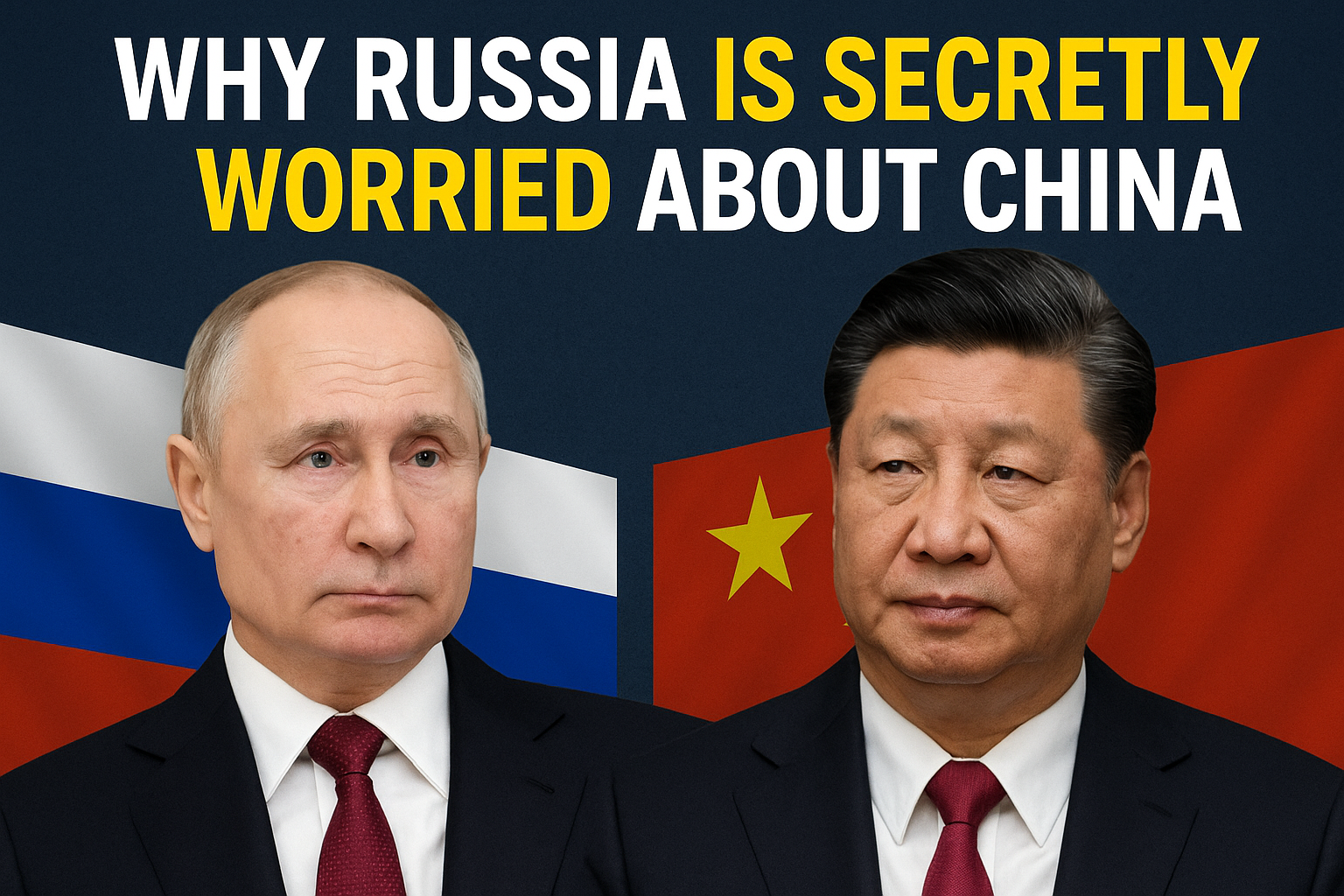Why Russia Is Secretly Worried About China?

How a leaked FSB document reveals cracks in the Russia-China partnership.
At first glance, the Russia-China partnership looks rock solid. Lavish diplomatic visits, handshakes between Vladimir Putin and Xi Jinping, and ambitious statements about changing the world order together, it all paints the picture of two superpowers walking in lockstep. But a recent intelligence leak reported by The New York Times tells a very different story. One where, behind the smiling photographs and bold declarations, there's a growing sense of anxiety within Moscow, especially inside its most powerful intelligence agency, the FSB.
And this anxiety is all about China.
A Leaked Document That Says a Lot Without Saying Everything
According to The New York Times, the leaked document, pulled from FSB servers by a hacker group, shows just how uncomfortable Russia has become with China's rapid rise. The FSB, the modern-day successor to the once-feared KGB, sees China not as a friend, but increasingly as a rival and even a potential threat.
This isn't just speculation. The leak includes signs that Russia is seriously concerned about Chinese espionage, strategic dominance, and territorial ambitions. It's clear that while Putin and Xi meet publicly and talk of brotherhood, behind closed doors, Russia is quietly bracing itself for a very different future.
What makes this leak even more important is that neither Russia nor China has fully denied it. Russia gave a generic statement calling China “important” but didn’t explicitly reject the leaked intelligence as fake. China, too, avoided a direct response choosing instead to focus on “overall relations” with Russia. This silence speaks volumes.
Putin vs. the FSB: Two Views on China
There appears to be a noticeable gap between how President Putin and the FSB view China. Putin has always leaned into diplomacy with Beijing sometimes out of strategic need, especially since the West isolated Moscow after the Ukraine invasion. But the FSB, which deals in the hard truths of espionage and defense, seems far less trusting.
Why? Because China isn’t just rising economically. It's outspending and outsmarting Russian intelligence, often buying off Russian agents, and spying on Russian defense projects to replicate them faster. The FSB is fully aware that China’s intelligence apparatus is bigger, better funded, and extremely assertive. This has sparked concern within Russia’s inner security circles: are we empowering a country that could become our biggest threat?
Russia and China: Allies Today, Rivals Tomorrow?
This isn’t the first time these concerns have come up. In 2023, Russia published a major foreign policy document naming India and China as its two closest strategic partners in the Eurasian region. At the time, many wondered what would happen if these two allies India and China went to war. Would Russia choose sides?
Now, after the FSB leak, we have some clues.
This isn’t just theory. Back in 2024, The Financial Times also published a leaked Russian contingency plan detailing how Moscow might respond if China were to suddenly attack Russia, even including nuclear options. Clearly, Russia is thinking beyond friendship slogans.
The Bitter Truth of Borders and Power Imbalance
While Russia and China have an internationally recognized border, history isn’t so easily forgotten or forgiven. Some Chinese scholars and even Communist Party voices continue to claim that parts of Russia’s eastern territories like Manchuria belong to China based on old imperial maps. These aren’t just fringe theories. They’re ideas that linger in Beijing’s strategic mindset.
Add to this the growing economic and military imbalance between the two countries. China's GDP and global influence continue to expand, while Russia faces economic challenges, international sanctions, and a costly war in Ukraine. The fear inside Russia is simple but powerful: what happens when your partner becomes too powerful?
Many in Russia now feel that China might not need them in the future. Worse, some worry China could exploit Russia’s weaknesses by dominating trade, stealing technology, or even staking territorial claims. It’s the classic story of what happens when one half of an alliance grows significantly stronger than the other. History is full of such examples and none of them end well for the weaker party.
Why India Should Pay Close Attention
This evolving dynamic between Russia and China is deeply relevant to India. For decades, India has enjoyed strong ties with Russia, especially in defense and energy. But with China becoming more assertive and the Russia-China relationship getting complicated, India has a strategic opportunity.
This doesn’t mean jumping to conclusions or expecting Russia to suddenly pivot entirely towards India. But it does mean that Moscow may see New Delhi as a more stable, trustworthy, and long-term partner,especially if tensions with China deepen over time.
India should stay observant, continue strengthening defense capabilities, and deepen its engagement with countries that share its concerns about China from the Quad (Japan, Australia, US) to ASEAN. At the same time, maintaining strong, balanced relations with Russia could prove valuable in this new geopolitical equation.
Conclusion: Strategic Partnerships Are Shaped by Interests, Not Sentiments
The recent FSB intelligence leak has revealed what many in global strategic circles have long speculated beneath the optics of solidarity, Russia harbors deep concerns over China's rise. This internal tension underscores a fundamental truth of international relations: alliances are rarely driven by ideology or sentiment, but by evolving national interests.
Even as Moscow and Beijing publicly project unity, Russia's strategic institutions are increasingly wary of China's growing economic and military dominance. Historical grievances, espionage fears, and territorial insecurities are reshaping the calculus within Russia’s core power structures.
For India and other regional players, this presents both a warning and an opportunity. As global power dynamics shift, navigating relationships with clarity and pragmatism becomes essential. In the end, what drives foreign policy isn’t friendship it’s national interest, leverage, and the ability to adapt to a changing geopolitical landscape.